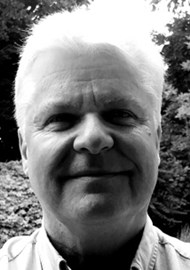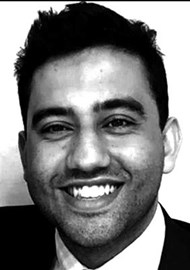Simulation in medical training is gaining prominence with every passing year, and BACO will have a large space showcasing this area. We hear from the organisers.
In recognition of the developing importance of simulation in surgical training, BACO 2018 has given the Surgical Skills Centre (SSC) pride of place in the centre of the exhibition trade hall. This will provide maximum visibility for the SSC among the multitude of stands present.
Numerous teaching platforms will be used including medical robots, virtual reality, animal and other innovative models. Teaching will be consultant led, providing an environment where trainees will acquire new skills that are assessed with validated assessment tools. Methodology will enable trainees to generate simulated work-based assessments (WBAs) from the Intercollegiate Surgical Curriculum Programme (ISCP) that are contemporaneously signed off by their trainer. For the innovative trainee, the potential exists to accrue a large number of validated WBAs if SSC opportunities are used to their full potential.
“The BACO Surgical Skills Centre offers an exceptional opportunity to learn using a variety of teaching platforms.”
The BACO 2015 experience was that a number of trainees signed up for teaching at registration but failed to ‘show-up’ to their training commitment. On the basis that anything free has a tendency to be under-valued by the human psyche, it was decided to charge a small fee for teaching in 2018. Nonetheless, despite the necessary fee to cover equipment and consumable costs, opportunities provided by the SSC represent a unique learning environment delivered at great value!
A 2012 survey by the Association of Surgeons in Training (ASiT) showed that only a third of ENT trainees in the UK had access to simulation-based training [1]. The Surgical Advisory Committee (SAC) is working hard to rectify the lack of uniform and compulsory integrated simulation training in otolaryngology. Nonetheless, much work is still required to incorporate consistent, structured simulation based training into the General Medical Council (GMC) approved ENT curriculum.
The intention of the BACO SSC is to inspire both trainees and trainers to adopt and integrate simulation based training into their local programmes. At the time of writing, several skills stations are planned for BACO 2018 representing all the subspecialties of otolaryngology – head and neck surgery.
Centre stage at the SSC will be the da Vinci robot with bolt-on simulator. This will permit trainees to learn how to use this technology for the first time. Simulation and reality use of the robot will provide understanding of the seven degrees of freedom that the machine confers. Allied to this will be the Mimic dV-Trainer (Figure 1) and Flex-dV trainer systems. Trainees will spend time on these training platforms before progressing to the da Vinci robot.
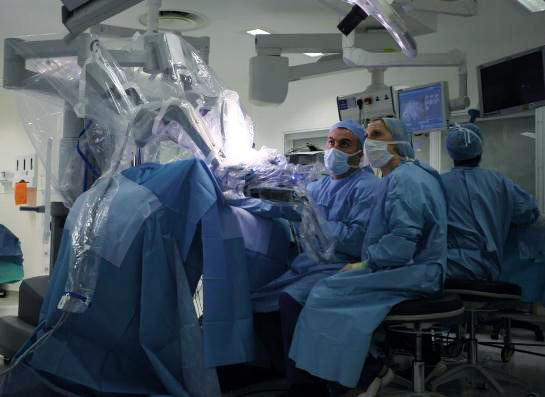
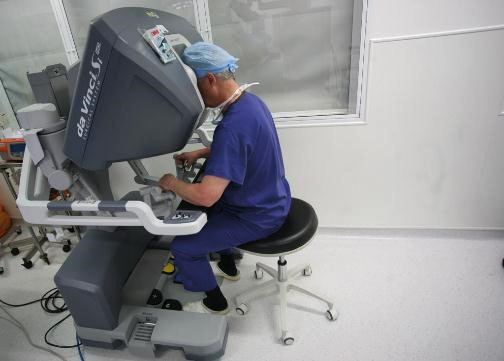
Figure 1. The da Vinci robot in action and the da Vinci robot console.
For the subspecialty of otology, two skills stations will permit training using the Voxelman virtual reality platform (Figure 2) and 3D printed temporal bones from Phacon (Figure 3). The former is highly recommended to trainees who have not had an opportunity to see or use this system before. It provides an insight into how training will be increasingly delivered in the future. Trainees will perform mastoid surgery on a platform that provides haptic feedback and simultaneously generates metrics for feedback on surgical performance.
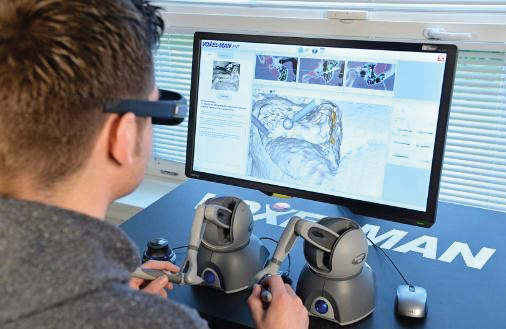
Figure 2. Voxelman temporal bone simulator.
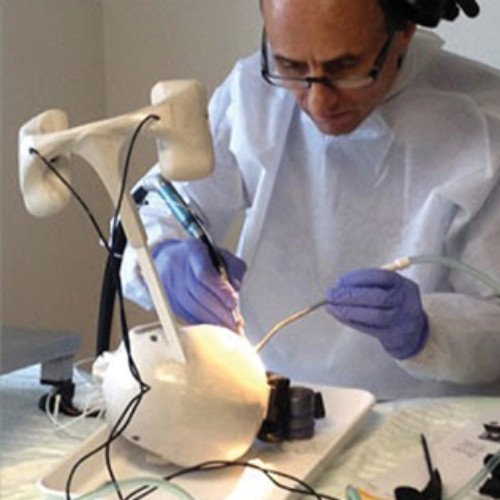
Figure 3. 3D printed temporal bone (Phacon).
3D printed temporal bones look and feel like cadaveric bones thereby exhibiting excellent face and content validity but without the requirement for paper work for cadaveric temporal bones! Again, this station is highly recommended for trainees, particularly in their early years (StR 3-5) of training.
Trainees with an interest in rhinology simulation based training will have opportunities to embrace virtual reality, animal and computerised teaching platforms. A virtual reality platform permits endoscopic sinus surgery training where tasks can be taught and completed. The sheep head provides excellent face and content validity to learn SPA ligation and fat-plug repair of anterior skull base defects.
“The intention of the BACO SSC is to inspire both trainees and trainers to adopt and integrate simulation based training into their local programmes.”
Professor PJ Wormald has kindly given permission to use his Scopis software to reconstruct the complex anatomy of the frontal sinus drainage pathway. Please do not pass up an opportunity to use this software, as it will considerably enhance your understanding of the planning and execution of frontal sinus surgery.
Laryngology has a strong presence, providing training with animal and Laryngotech models. Trainees will have the opportunity to perform a variety of phonosurgical tasks such as, medialisation laryngoplasty, cordectomy, removal of cord lesions. The Laryngology skills station also has an opportunity to learn practical aspects of flexible endoscopic examinations of swallowing (FEES) aided by teaching from a speech therapist.
The SSC will have an opportunity to learn ultrasound scanning of the head and neck. This again is a highly recommended if not a ‘must-do’ station for senior trainees wishing to pursue subspecialisation in head and neck surgery. Two consultants that are expert in ultrasound scanning of the head and neck will run this skill station (Figure 4).
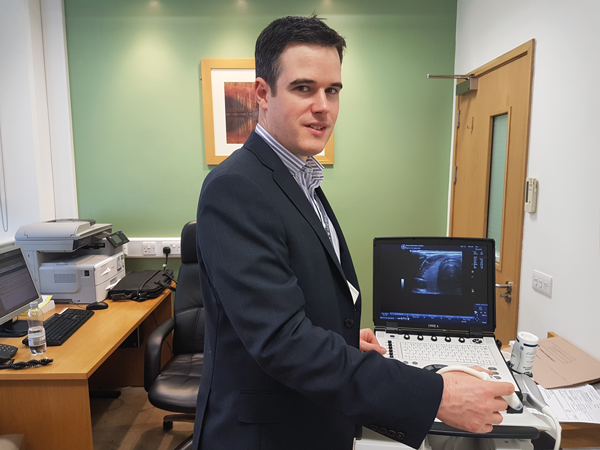
Figure 4. Mr Bernstein, Head and Neck Consultant, with his portable US machine.
(Photo credit: Jonathan Bernstein.)
Facial plastic surgery will be represented by an opportunity to learn both the principles and execution of Z-plasty, W-plasty, V-Y advancement, bilobed, rhomboid and rotation flaps.
ENT trainees are required to have accrued experience in 10 paediatric bronchoscopies by the time they complete their training. There will be excellent opportunities to acquire knowledge, skills and even simulated WBAs in the Paediatric Bronchoscopic skills station. This is another ‘must-do’ skills station that is strongly recommended for trainees of all grades.
Allied to this, another station will provide a learning opportunity for the CICO (cannot intubate cannot oxygenate) scenario. Front of neck access (FONA) techniques – cricothyroidotomy and tracheostomy – will enable early year trainees to accrue WBAs for these skills.
Although not an independent skill station for practical and logistical reasons, visitors to the SSC will have an opportunity to study NOTSS scenarios (non-operative skills for surgeons) that have been used for ENT trainees in North Thames. The scenarios have been validated and reveal how working in teams can be assessed but how loss of ‘situational awareness’ can lead to a poor patient outcome. All ENT surgeons and trainees should be aware of the unfortunate case of Elaine Bromiley [2] which showed that failure of situational awareness and poor team working can happen to all theatre teams – including those that are experienced!
Finally, the SSC will give delegates the opportunity to see and use the world’s first digital 3D-microscope provided by Arriscope.
A huge effort and expense has been undertaken to ensure that the BACO 2018 Surgical Skills Centre will be both a unique and an overwhelming success. It is very much encouraged that all trainees and even consultants take this unique opportunity to learn, experience and acquire inspiration and skills.
References
1. Milburn JA, Khera G, Hornby ST, et al. Introduction, availability and role of simulation in surgical education and training: review of current evidence and recommendations from the Association of Surgeons in Training. International Journal of Surgery 2012;10(8):393-8.
2. Fong K. What we can learn from fatal mistakes in surgery. BBC News 2013;
http://www.bbc.co.uk/news/health-21829540
Last accessed 10 November 2017.

